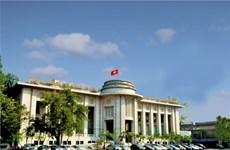Real estate supply, demand in HCM City decrease amid COVID-19 outbreak
Real estate business and housing construction in Ho Chi Minh City have been hit hard by the COVID-19 pandemic, with significant decreases recorded in supply and demand, according to market watchers.
 Buildings in Ho Chi Minh City (Source: VNA)
Buildings in Ho Chi Minh City (Source: VNA)HCM City (VNA) – Real estate business and housing construction in Ho Chi Minh City have been hit hard by the COVID-19 pandemic, with significant decreases recorded in supply and demand, according to market watchers.
By the end of the first quarter, rent for the ground floor and first floor property in the downtown area of the city had fallen by 11 percent compared with the fourth quarter of 2019, while rent in the suburbs was down 15.9 percent.
For the office market, the average rent of Grade-A offices in Q1 was 44.6 USD per sq.m per month, down 1.2 percent against the previous quarter and 3.6 percent year-on-year.
Senior Director and Head of Valuation and Market Research Services at CBRE Vietnam Duong Thuy Dung said that after the COVID-19 pandemic, the office market could reshape, with tenants starting to pay more attention to the health of employees by choosing high-quality buildings instead of just saving money as before.
So buildings which are environmentally friendly will be preferred, she added.
Regarding the apartment market, she said that the city’s market is continuing to witness a decline in supply. A number of projects in Nha Be district and Districts 2, 9 and 10 have postponed their launches in the first quarter because of regulations on large gathering. From January-March, 3,757 apartments were sold, down 32 percent against the previous quarter, with the mid-end segment accounting for 58 percent of the total supply.
The 15-day social distancing period, starting April 1, will force the projects to continue postponing their dates of release. In addition, the suspension of flights and the tighter granting of visas will keep foreign customers from accessing the real estate market in Vietnam.
Those who want to buy houses or apartments will face difficulties accessing bank loans due to fluctuating interest rates and the higher standards banks are setting to approve loans.
Amid the complicated developments of the pandemic, Dung gave two scenarios for the apartment segment in Ho Chi Minh City. If the pandemic is put under control before June, the supply of new apartments will reach approximately 28,000 units, an increase of 5 percent compared to 2019, and the average price will rise by 5 percent. In case the date is September, there will be only about 15,000 new apartments, equal to 40 percent compared to that of 2019, and the average price will decrease by 5 percent.
Recently, in the process of developing a draft on the extension of the deadline for paying taxes and land rents, the Ministry of Finance added real estate businesses as subject to the extension. This move is expected to help these businesses overcome difficulties to survive, recover and develop to meet local demand for housing.
Ho Chi Minh City is the largest city in Vietnam and the economic hub of the southern region. Accounting for 0.6 percent of Vietnam’s total land area and about 9 percent of the country’s population, it is part of the southern key economic zone, which also comprises Dong Nai, Ba Ria - Vung Tau, Binh Duong, Long An, Tay Ninh and Binh Phuoc provinces. In the southern economic hub, over 3,000 projects across all sectors are supported by foreign capital, while the number of registered enterprises has exceeded 100,000.
In 2019, the city attracted 8.3 billion USD worth of foreign investment, with its labour productivity being nearly three times that of the whole country (299.8 million VND per person, an increase of 6.8 percent over 2018).
Meanwhile, the total number of international visitors to the city reached 8.5 million, a year-on-year increase of 14 percent with revenues up by 14.5 percent over 2018
The local gross regional domestic product (GRDP) reached more than 1.34 quadrillion VND, an 8.32 percent increase year-on-year.
Before the outbreak of COVID-19, the city set a target of achieving a growth rate of 8.5 percent for GRDP in 2020, with total private investment accounting for 35 percent of GRDP.
This year, HCM City also aims to have 44,000 new businesses, creating 135,000 new jobs./.













